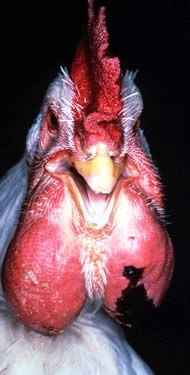Fowl Cholera (or pasteurellosis)
Fowl Cholera (or pasteurellosis)
Fowl cholera is a contagious bacterial infection. The disease can range from acute septicaemia (blood poisoning) to chronic and localised infections. Domestic fowl, game birds and small feral birds are susceptible. Turkeys are more susceptible than chickens, older chickens are more susceptible than younger ones, and some breeds of chickens are more susceptible than others. The disease is rare in broiler-aged chickens.
Clinical findings vary greatly depending on the course of the disease. In acute cases, increased mortality is usually the first indication. Affected birds have swelling of the face or wattles, discharge from the nostrils, mouth and eyes which may become “cheesy”, laboured breathing and, in some cases, lack of coordination. The face, combs and wattles may become cyanotic (turn a bluish colour). Other symptoms include depression, loss of appetite, lameness, diarrhoea and ruffled feathers.

Swollen wattles from fowl cholera Source: The Merck Veterinary Manual
What causes fowl cholera?
Fowl cholera is caused by the bacterium Pasteurella multocida. Chronically infected birds are considered to be a major source of infection and recovered birds remain carriers. Transmission is from bird to bird or from infected premises.
Prevention and treatment of fowl cholera
Fowl cholera can be treated with sulfonamides and antibiotics. Vaccines are available but give variable results. A live attenuated vaccine has been developed in Australia by Poultry CRC partners Bioproperties Pty Ltd, under the trade name Vaxsafe ® PM. A live vaccine will give more widespread protection than the individual inactivated types.
The disease is best controlled by eradication. Prevention relies on good biosecurity practices, with good sanitation and rodent control and separation of birds by age with thorough cleanout between flocks. This bacterium is susceptible to ordinary disinfectants, sunlight, drying, and heat.

